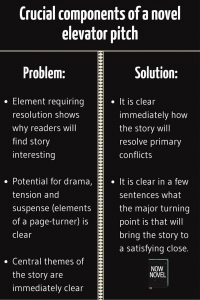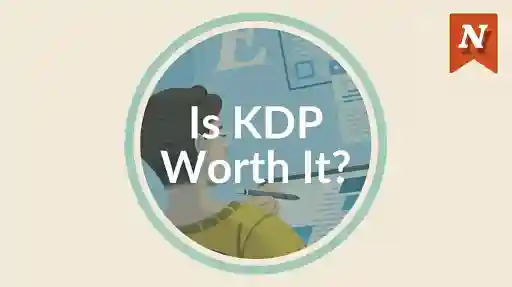What is an elevator pitch? It's a proposal that can be delivered in about 60 seconds verbally or in a single written page of text. The term is standard in marketing. A great elevator pitch novel writers can use to sell their novels should have at least the following 5 features:
1. The elevator pitch should be concise
Concision (saying as much as possible using as few words as possible) is always important in writing style because if you don't waffle, you give the reader maximum value. This rule applies in fiction-writing and promotional communication alike. Especially the latter, because while a reader might sit down to read a book leisurely, publishers are busy people who receive many pitches.
To make the elevator pitch for your novel suitably short:
- Cut out unnecessary phrases, e.g. 'The book is about'. Instead of 'The book is about a man who is able to predict environmental disasters with freakish accuracy,' write 'Ben has a mysterious power: The ability to predict environmental disasters.'
- Only include what is most interesting about your book - the primary themes, character and conflict of your story
To grab someone's attention in 60 seconds, you need a hook:
2. It should have a compelling hook
Your elevator pitch needs a compelling hook because otherwise it will fail to stand out in a sea of pitches. Make it interesting by:
- Creating a strong 'why' (Why did the girl go missing? Why has the son not spoke to his father in 40 years?)
- Indicate stakes and sources of tension (Give a sense of how your book will grip readers, even if it's a romance novel and not a thriller - sell what makes your characters' relationship compelling. Is there an obstacle to their being together? Reference this obstacle clearly in your pitch).
3. It should pose a satisfying pairing of problem and solution

Great stories pose interesting problems (such as 'What if a man was the last human on earth?' Or 'what if there were a portal leading to another world where society and power are configured completely differently?')
The best elevator pitch novel writers can create is one that clarifies a story's central problem and ultimate solution. Within the 'problem' part of the pitch:
- The potential for reader interest should be clear (ask 'Why would readers in my target audience find this interesting?')
- The potential for drama, suspense and tension (the ingredients of page-turners) should be clear
- The themes the story deals with (for example power, corruption and lies) should be clear
Within the 'solution' part of the pitch:
- It should be clear how your story will creatively resolve primary conflicts
- It should be clear in just a few sentences or bullet points what the ultimate crux of the story will be
4. It shoud clearly identify your target audience or market
The simple truth is that publishers are working in a world where it is increasingly challenging to earn good money without herculean effort. So reduce the amount of joining the dots publishers have to do because it will make your pitch more appealing. Make your elevator pitch identify your target audience or market (and why your story in particular will appeal to it) in as few words as possible.
It's advisable to keep your story summary separate from details on your target market because this lets the pitch recipient digest your central idea without other distraction. It's a good idea to simply put 'Target Audience' as one of the subheadings beneath your headings identifying word count and genre. Including this shows the editor or small publisher that you have thought consciously about where your book will fit in the crowded market. Mention approximate reading age group and interest categories (e.g. readers of literary romance who enjoy [x established authors]).
5. It should be reducible to a single sentence
If you have truly distilled what makes your unique story fantastic and worthy of publication, you should be able to reduce your pitch to a single sentence. This is the kind of information that will be placed on a dustjacket.
If you want inspiration on how to write short, powerful summaries of your story ideas, see the collected lists of New York Times bestsellers here, where you can read the blurb for each book. For example, looking at blurbs from the NYT bestseller list for January 3rd, 2016:
'Detective Alex Cross returns to Starksville, N.C., his hometown, for the first time in 35 years, to help a cousin who has been accused of murder.' - James Patterson, Cross Justice
'A mystical tale of a guitar genius’s journey through 20th-century music.' - Mitch Albom, The Magic Strings of Frankie Presto
Both the above examples contain several of the ingredients of a great novel elevator pitch. Why? Because:
- They tell us who the central character is
- They raise questions (why hasn't Alex Cross been home in 35 years?)
- They promise intrigue (the detective's cousin is accused of murder, Frankie Presto is a genius and his story promises to be 'mystical').
- They also make a potential audience apparent (Patterson's blurb appeals to fans of murder mystery and detective novels, while the latter appeals to fans of the kunstleroman, the novel about an artist's personal development.)
The above are all important elements of an elevator pitch novel authors can use to gain notice. If you haven't started writing a novel yet, though, or are stuck in any way, try the helpful Now Novel process becuase it will help you start and finish telling your story.










So clear, so helpful.
Colette Byrne - Almost 5 years ago
Thank you Colette, I'm glad this article was helpful! We appreciate your feedback.
Jordan - Almost 5 years ago
Thank you. I am writing an elevator hook and will use your guidelines.
Dr. Sandra Arlean Tanner - Over 4 years ago
Hi Sandra, it's a pleasure. I'm glad this was helpful to your current process and project. Please feel free to share it for feedback in our online writing groups when you're done.
Jordan - Over 4 years ago
Thanks for the leg up. I can stop chasing my tail.
William Rice - Over 3 years ago
I hope you catch it, William. Good luck with writing your pitch.
Jordan - Over 3 years ago